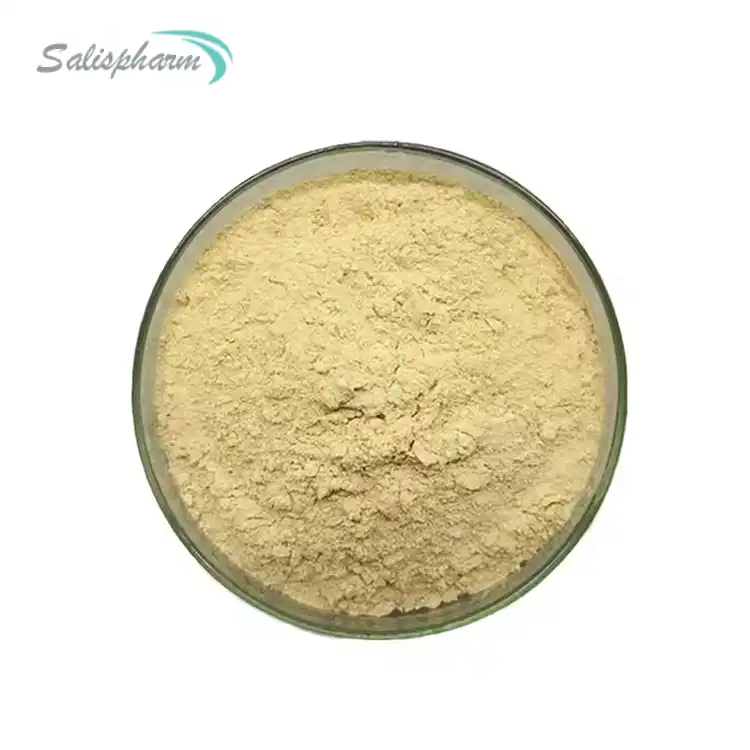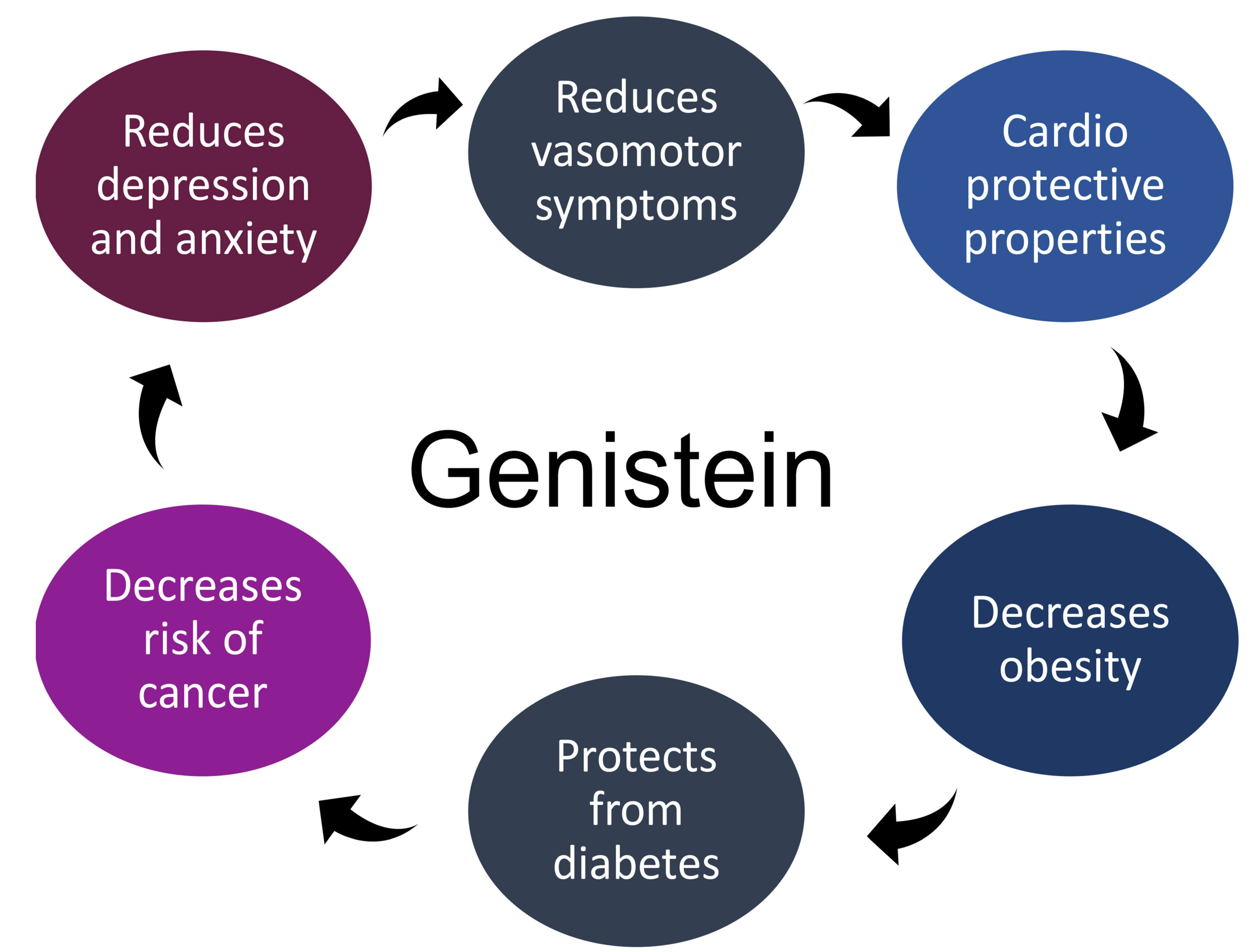Genistein powder is a popular dietary supplement that has gained attention for its potential health benefits. However, there's often confusion about what exactly genistein is and how it functions in the body. To clarify, genistein powder is not a protein itself, but rather an isoflavone compound found in certain plants, particularly soybeans. Isoflavones are a type of phytoestrogen, which are plant-derived compounds that can mimic some of the effects of estrogen in the body. While genistein is not a protein, it can interact with proteins in the body and influence various biological processes.

What are the health benefits of genistein powder?
Genistein powder has been associated with a wide range of potential health benefits, making it a subject of interest for both researchers and health-conscious individuals. One of the primary reasons people turn to genistein supplements is for its potential to support overall health and well-being.
Firstly, genistein has shown promise in supporting cardiovascular health. Studies have suggested that regular consumption of genistein may help maintain healthy cholesterol levels and support proper blood vessel function. This is particularly important for individuals concerned about heart health, as these factors play a crucial role in maintaining a healthy cardiovascular system.
Another area where genistein has garnered attention is in bone health. As we age, maintaining strong and healthy bones becomes increasingly important. Genistein has been studied for its potential to support bone density and strength, particularly in postmenopausal women. Some research suggests that genistein may help promote the activity of bone-forming cells while inhibiting the activity of cells that break down bone tissue.
Genistein's antioxidant properties have also been a focus of research. Antioxidants play a crucial role in protecting our cells from damage caused by free radicals, which are unstable molecules that can contribute to various health issues and accelerate the aging process. By acting as an antioxidant, genistein may help support overall cellular health and potentially reduce the risk of certain chronic diseases.
Furthermore, genistein has been studied for its potential effects on hormonal balance, particularly in women. As a phytoestrogen, genistein can interact with estrogen receptors in the body, potentially helping to alleviate some symptoms associated with hormonal changes, such as those experienced during menopause.
It's important to note that while these potential benefits are promising, more research is needed to fully understand the extent of genistein's effects on human health. As with any supplement, it's always best to consult with a healthcare professional before incorporating genistein powder into your diet or supplement regimen.
How does genistein powder compare to other isoflavones?
Genistein is one of several isoflavones found in soybeans and other plants, and it's often compared to other compounds in this class. To understand how genistein powder compares to other isoflavones, it's helpful to look at its unique properties and how it functions in the body.
One of the most well-known isoflavones alongside genistein is daidzein. Both genistein and daidzein are found in significant quantities in soybeans and soy-based products. However, genistein is often considered to be more potent in terms of its estrogenic activity. This means that genistein may have a stronger ability to interact with estrogen receptors in the body, potentially leading to more pronounced effects on hormonal balance and related processes.
Another key difference between genistein and other isoflavones lies in its molecular structure. Genistein has a unique structure that allows it to interact with various enzymes and cellular receptors in ways that other isoflavones may not. For example, genistein has been shown to be a potent inhibitor of tyrosine kinases, enzymes that play crucial roles in cell signaling and growth. This property sets genistein apart from many other isoflavones and may contribute to its potential anti-cancer effects, which have been a subject of ongoing research.
When it comes to absorption and metabolism, genistein also shows some distinct characteristics. The body's ability to absorb and utilize genistein can vary significantly between individuals, largely due to differences in gut bacteria composition. Some people possess gut bacteria that can convert certain isoflavones into more active forms, potentially enhancing their biological effects. In the case of genistein, it can be converted to equol, a compound that may have even stronger estrogenic effects than genistein itself. However, not all individuals have the gut bacteria necessary for this conversion, which can lead to variations in how people respond to genistein supplementation.
In terms of dietary sources, while genistein is predominantly found in soybeans and soy products, other isoflavones may have different plant sources. For example, red clover is a rich source of biochanin A and formononetin, which are other types of isoflavones. This diversity in sources can make it easier for individuals to incorporate a variety of isoflavones into their diet, potentially leading to a more balanced intake of these beneficial compounds.
When considering supplementation, genistein powder offers the advantage of being a concentrated form of this specific isoflavone. This can be beneficial for individuals looking to target the potential health benefits associated with genistein specifically. However, it's worth noting that many supplements and dietary sources provide a mix of isoflavones, which may offer synergistic effects and a broader range of potential benefits.
Can genistein powder affect hormone levels in the body?
One of the most intriguing aspects of genistein powder is its potential to influence hormone levels in the body, particularly estrogen. This property is due to genistein's classification as a phytoestrogen, a plant-derived compound that can mimic some of the effects of estrogen in the body. Understanding how genistein interacts with hormones is crucial for anyone considering its use as a supplement.
Genistein's ability to affect hormone levels primarily stems from its structural similarity to estradiol, the primary form of estrogen in humans. This similarity allows genistein to bind to estrogen receptors in various tissues throughout the body. However, it's important to note that genistein's estrogenic activity is generally weaker than that of natural estrogen produced by the body. This means that while genistein can interact with estrogen receptors, its effects are typically more subtle and may vary depending on the individual's hormonal status and the specific tissue involved.
In premenopausal women, the effects of genistein on hormone levels may be less pronounced due to the presence of higher levels of natural estrogen. However, in postmenopausal women, who have lower estrogen levels, genistein may have more noticeable effects. Some studies have suggested that genistein supplementation could help alleviate certain symptoms associated with menopause, such as hot flashes and bone loss, by providing a mild estrogenic effect.
It's worth noting that genistein's hormonal effects are not limited to estrogen-like activity. Research has also shown that genistein can influence other hormones and hormone-related processes in the body. For example, some studies have suggested that genistein may help modulate thyroid hormone levels, although more research is needed to fully understand this relationship.
It's also important to consider that the effects of genistein on hormone levels can vary significantly between individuals. Factors such as age, gender, overall health status, and even genetic variations can influence how a person's body responds to genistein supplementation. Additionally, the dose and duration of genistein use can play a role in its hormonal effects.
Conclusion
While genistein powder is not a protein itself, it is a compound that can have significant effects on various biological processes in the body, including hormone regulation. Its potential health benefits, comparison to other isoflavones, and ability to influence hormone levels make it a fascinating subject of ongoing research. As with any supplement, it's essential to approach genistein use with caution and under the guidance of a healthcare professional.
If you are also interested in this product and want to know more product details, or want to know about other related products, please feel free to contact lea_slsbio@163.com,WhatsApp+86 13193326505.

References
1. Ganai, A. A., & Farooqi, H. (2015). Bioactivity of genistein: A review of in vitro and in vivo studies. Biomedicine & Pharmacotherapy, 76, 30-38.
2. Squadrito, F., Marini, H., Bitto, A., Altavilla, D., Polito, F., Adamo, E. B., ... & Minutoli, L. (2013). Genistein in the metabolic syndrome: results of a randomized clinical trial. The Journal of Clinical Endocrinology & Metabolism, 98(8), 3366-3374.
3. Xiao, C. W. (2008). Health effects of soy protein and isoflavones in humans. The Journal of nutrition, 138(6), 1244S-1249S.
4. Barnes, S., Kim, H., Darley-Usmar, V., Patel, R., Xu, J., Boersma, B., & Luo, M. (2000). Beyond ERα and ERβ: estrogen receptor binding is only part of the isoflavone story. The Journal of nutrition, 130(3), 656S-657S.
5. Messina, M. (2014). Soy foods, isoflavones, and the health of postmenopausal women. The American journal of clinical nutrition, 100(suppl_1), 423S-430S.
6. Setchell, K. D., & Clerici, C. (2010). Equol: history, chemistry, and formation. The Journal of nutrition, 140(7), 1355S-1362S.
7. Patisaul, H. B., & Jefferson, W. (2010). The pros and cons of phytoestrogens. Frontiers in neuroendocrinology, 31(4), 400-419.
8. Spagnuolo, C., Russo, G. L., Orhan, I. E., Habtemariam, S., Daglia, M., Sureda, A., ... & Nabavi, S. F. (2015). Genistein and cancer: current status, challenges, and future directions. Advances in nutrition, 6(4), 408-419.
9. Kuiper, G. G., Lemmen, J. G., Carlsson, B. O., Corton, J. C., Safe, S. H., Van Der Saag, P. T., ... & Gustafsson, J. Å. (1998). Interaction of estrogenic chemicals and phytoestrogens with estrogen receptor β. Endocrinology, 139(10), 4252-4263.
10. Cassidy, A., & Minihane, A. M. (2017). The role of metabolism (and the microbiome) in defining the clinical efficacy of dietary flavonoids. The American journal of clinical nutrition, 105(1), 10-22.

